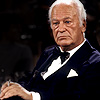The article makes clear that LeCarre's attitude has remained consistently dim throughout the years. His most recent comments on the subject:
"These days I would be much kinder. I suppose we've lost sight of the books in favour of the film versions, haven't we? I was a young man and I knew that I had written about the reality in The Spy Who Came In From The Cold and that the Fleming stuff was a deliberate fantasisation of Fleming's own experiences when he was safely in New York. But at the root of Bond there was something neo-fascistic and totally materialist. You felt he would have gone through the same antics for any country really, if the girls had been so pretty and the Martinis so dry."
Note the underhanded slam against the real-life espionage experience of Fleming, who apparently spent World War II hiding in New York! No mention of the fact that as Assistant to the Head of Naval Intelligence, Fleming probably helped save more lives and helped his country more than LeCarre ever did. That reality would be harder to acknowledge.
Note the tone-deaf ignorance of the hardly subtle or easy-to-miss patriotism in Fleming's work--I highly doubt that LeCarre has ever read Fleming, at least in anything resembling depth. Bond's girls (most of whom aren't British) and martinis are the rewards he gives himself after having gone through extreme pain and tension for a country he's quote obviously fond of, even at its weakest (note the angry speech in Britain's defense in YOLT). But they're not the reason he does what he does. Shallow readers can easily read Bond as being a hedonist who spends all his time in casinos eating caviar--a reading that ignores all the moments of drabness and physical discomfort that pervade the novels.
The idea that Bond would go wherever material benefits took him is belied by his repeated moments of national pride, as exhibited in Bond's flash of homesickness in Dr. No, or the loving, secretly complimentary portrayal of the Secret Service given by the Russian spy-chiefs in FRWL, where the Russians wonder why English spies are so dedicated despite their low pay and anonymity (unlike the USSR, where killers like Grant get private vacation villas and anything else they could ask for). And Bond's notorious attitudes toward foreigners and other races are reflections of someone who thinks God is an Englishman. LeCarre doesn't seem to have picked up on what is bloody obvious for everyone else.
Why then does LeCarre think this way? Aside from the obvious answer--that he looks down on the Bond books too much to actually read them--it may have something to do with his mentality. The idea that Bond might do what he does out of love for his country might seem incomprehensible and unbelievable to LeCarre, to whom patriotism is nothing more than a fig leaf for villainy. If Fleming had originally appealed to reader's fantasies, LeCarre made his fortune by appealing to their guilty conscience. His picture of the world ultimately became as cartoonish as Fleming's, but it's the sort of cartoon designed to flatter the sensibilities of intelligent, educated, upper-middle class Westerners trying to deal with cold war misgivings, colonial guilt, anti-corporate outrage, and so on. Because LeCarre was on the right side, he was "realistic," even at his most contrived (and even though Fleming used just as much, if not more detail in describing espionage). The Bond films made people think the books were just as escapist, and so middle-brows decided that LeCarre's glumness and drabness, no matter how stylized and occasionally overdone, were reality and thus greater art. This is not to deny
The Spy Who Came In From The Cold's genuine status as a masterpiece, or that my own politics are closer to LeCarre's than Fleming's. But it is meant to emphasize that LeCarre can be a lousy reader, and a singularly petty one too. Shame.
Edited by Revelator, 19 August 2010 - 04:54 PM.











